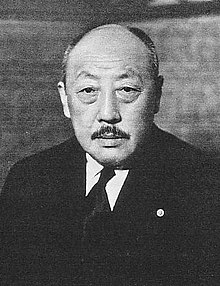Zhang Jinghui
| Zhang Jinghui 張景惠 |
|
|---|---|
 |
|
| Prime Minister of Manchukuo | |
|
In office May 1935 – August 1945 |
|
| Monarch | Puyi |
| Preceded by | Zheng Xiaoxu |
| Succeeded by | Position abolished |
| Minister of War | |
|
In office March 1932 – May 1935 |
|
| Personal details | |
| Born | 1871 Tai'an, Liaoning, Empire of China |
| Died | 1 November 1959 (aged 87–88) Fushun, People's Republic of China |
| Political party | Concordia Association |
| Military service | |
| Allegiance |
|
| Battles/wars |
First Sino-Japanese War Russo-Japanese War |
Zhang Jinghui (Chang Ching-hui; simplified Chinese: 张景惠; traditional Chinese: 張景惠; pinyin: Zhāng Jǐnghuì; Wade–Giles: Chang1 Ching3-hui4; Hepburn: Chō Keikei); (1871 – 1 November 1959) was a Chinese general and politician during the Warlord era. He is noted for his role in the Japanese puppet regime of Manchukuo in which he served as its second and final Prime Minister.
Zhang Jinghui was born in Tai'an, southwest of Mukden, Liaoning Province. The area was a battlefield in the First Sino-Japanese War, and Zhang joined the Honghuzi irregular cavalry forces of the Manchurian warlord Zhang Zuolin at an early age. These forces were recruited as mercenaries by the Japanese during the Russo-Japanese War of 1904-1905. In the final years of the Qing dynasty, Zhang Zuolin was appointed Viceroy of Three Northeast Provinces with his base at Fengtian, and with the Xinhai Revolution, managed to obtain recognition of his forces as part of the new Republic of China military. At that time, Zhang Jinghui was appointed commander of the Beiyang Army’s 27th Infantry Brigade. However, with the death of Yuan Shikai in 1916, the Beiyang Army split into several mutually hostile factions. Zhang Jinghui deserted Zhang Zuolin to join with Wu Peifu's Zhili clique. He later rejoined Zhang Zuolin and served as his Minister of War in the Beiyang Government from May 1926 to June 1927. He then served as Minister of Enterprises in the Beiyang Government from June 1927 to June 1928. Within the year he was appointed governor of the Harbin and China Eastern Railway Special District in northern Manchuria. However, following the death of Zhang Zuolin in the Huanggutun Incident on June 4, 1928 Zhang Jinghui’s relations with his successor, Zhang Xueliang and Zhang Jinghui participated in a national unity conference called by Kuomingtang leader Chiang Kai-shek in January 1929 in Nanjing.
...
Wikipedia
